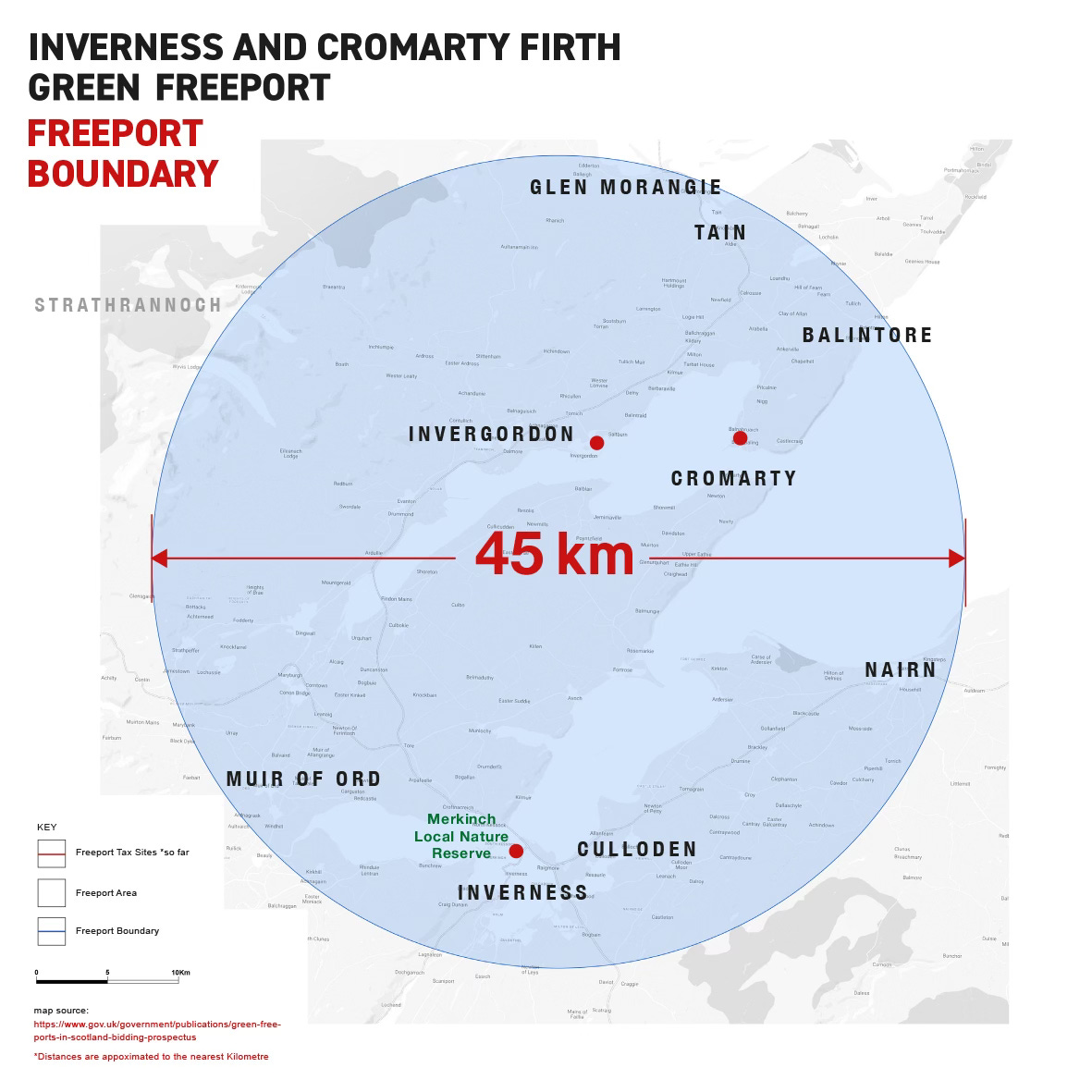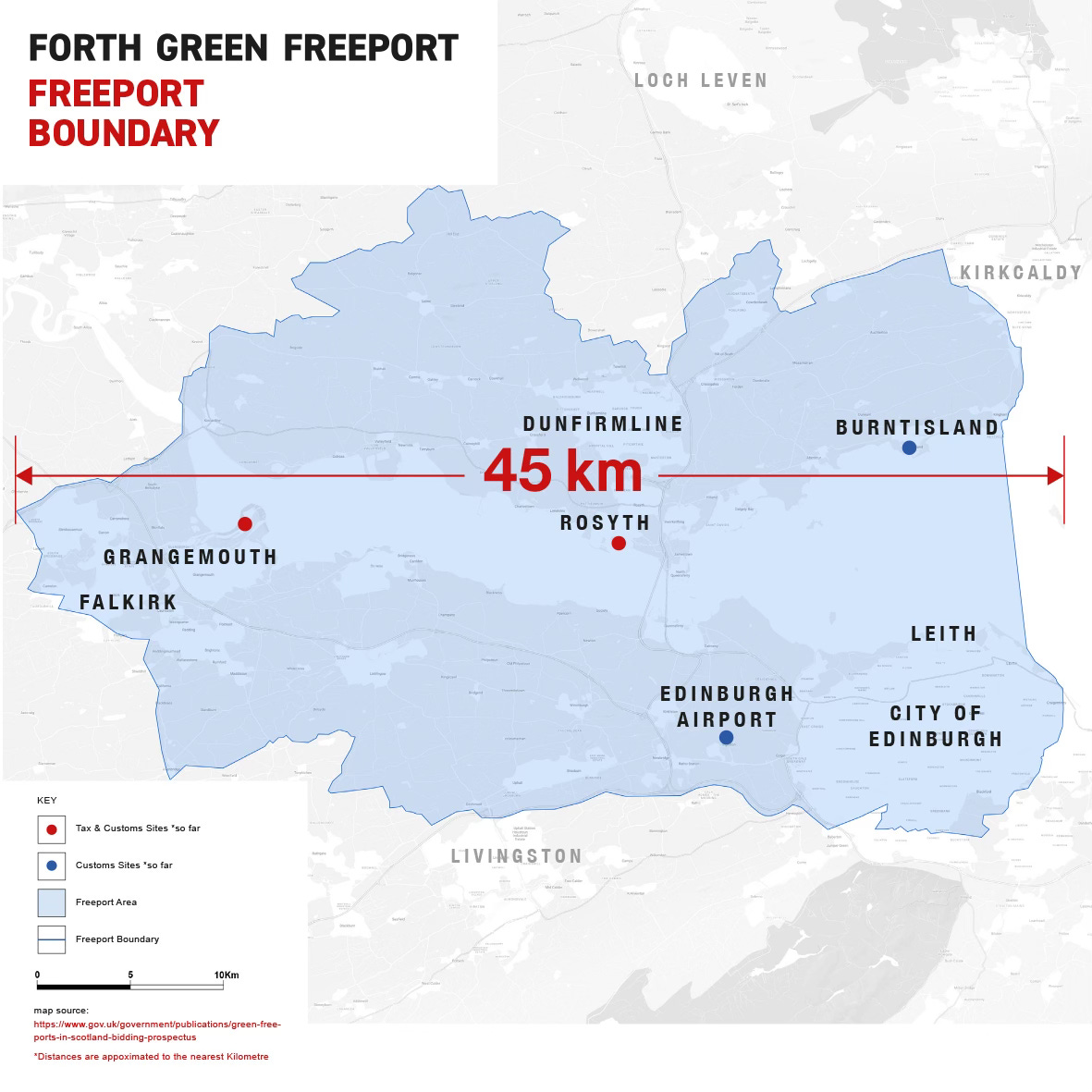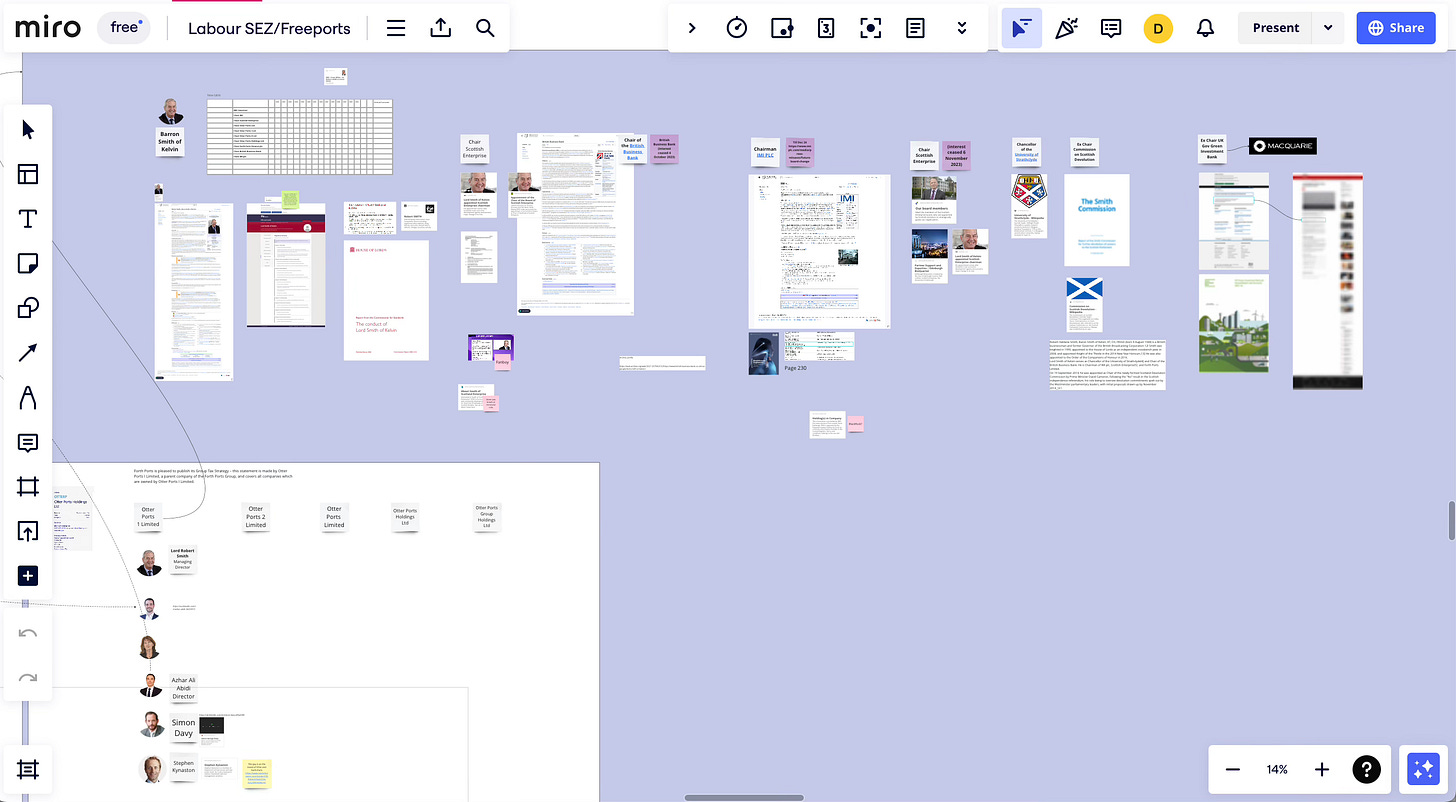This piece comes from my written reply to Bylines Scotland, namely Andrew Sharpe’s article published on 12 February 2025 titled ‘Scotland’s Green Freeports – Good or Bad? Let’s Fact Check the Myths
https://bylines.scot/news/economics/business/scotlands-green-freeports-good-or-bad-lets-fact-check-the-myths/?feed_id=2662&_unique_id=67ac3fade5db0
Andrew Sharpe is a promoter of the glossy brochure version of Freeports and conveniently omits key issues about the dangers of deregulated free zones to local communities and infrastructure. I offer some corrections below. Sharpe ignores the surrounding Special Economic Zones of the 2 so-called Green Freeports which are both up to 45km in diameter, the Firth of Forth covers 70% of the City of Edinburgh. There are 18 SEZs in Scotland.
Free zones include corporate tax breaks set at 10 years by Jeremy Hunt, the duration of the free zone licenses is 25 years. 'Exemption from business rates and tax allowances for capital investments reduces firm costs, making them more profitable and allowing them to expand. However, the incentive mix available to firms actually encourages businesses to substitute labour with capital inputs. This drastically impacts job creation targets that libertarian backers of free zones espoused, eg. jobs and firms displacement. Shifting workers to places of lower productivity has already proven harmful to the national economy. SEZs have to be maintained at astronomical costs to the taxpayers.
The UK Govt's website lists what went wrong with Thatcher's SEZs, from job displacement, underwhelming economic growth that missed its targets, while concluding that they came up against the EU's laws on State aid. "The demise of EZs was attributed to the effects of delays owing to European Commission State Aid regulations" "One of the Government’s primary objectives is to ensure that the private sector recovery will generate a sufficient number of jobs to offset the forthcoming public sector job losses" Source https://centreforcities.org/wp-content/uploads/2014/09/11-02-28-What-would-Maggie-do-Enterprise-Zones.pdf
The Office for Budget Responsibility’s October 2021 Economic and Fiscal Outlook includes a comparison of the estimated costs of the different Enterprise Zones announcements between 2011 and 2015 with the actual cost of these measures. This found costs were “around a quarter of the original estimates, suggesting much smaller impacts than initially hoped.” The OBR also refers to the 2019 UN World Investment Report, Special Economic Zones, a study of Enterprise Zones internationally. This found “little difference in performance between cities with zones and those without” and that factors such as existing infrastructure and transportation links were “stronger determinants of performance” in economic regeneration. https://commonslibrary.parliament.uk/research-briefings/sn05942/
The necessary monitoring of State aid distribution, of collecting and processing data backed by economic evidence that indicates economic growth or lack thereof, an accurate and continually updated stream of statistics on job creation or lack thereof, on freeport/SEZ management, on value for taxpayers money, on environmental pollution versus preservation, on 'inhouse' independent audits, on crony capitalism, are just some examples where companies located within privately owned Freeport/SEZ boundaries can commit crimes frequently associated with deregulated free zones, this is based on companies being able to 'self-regulate' inside the zones.
Companies first and foremost seek to make profits and deregulated zones offer them myriad opportunities to rip up rules that apply to regions outside the zones. UK Government requests for statistical information would be reduced. A common argument against Enterprise Zones is that they result in job displacement rather than job creation – i.e., existing local companies relocate to enterprise zones to take advantage of financial incentives, keeping their existing workforce rather than firms from outside the area relocating and creating new jobs.
A 2011 report by the Work Foundation found that “up to 80%” of jobs created by enterprise zones in the 1980s were in fact “taken from other places.” These include money laundering, fraud, environmental pollution, tax evasion, land grabbing, shredding of workers rights, weapons/drugs, and human trafficking, stolen art, along with modern-day slavery.
Job displacement is a common feature as people leave one run-down region looking for jobs in an SEZ. Corporations are already pushing to extend their tax breaks beyond the 10-year deadline. All UK 74 SEZs and 12 Freeports are licensed for a quarter of a century, this was set by Jeremy Hunt. UK SEZs contravene the EU's rules on State aid and a whole raft of regulations that protect public health, worker’s rights, food safety, and the environment.
Deregulation is the process of removing state regulations, typically in the economic sphere. It is the repeal of governmental regulation of the economy. Note that Sharpe's citing of an EU amending regulation dated 2017 (after having read it) does not in any shape or form permit what is considered distortions to the integrity of the EU's Single Market.
An updated 2020 EU Commission document can be found here. https://europarl.europa.eu/RegData/etudes/BRIE/2020/646164/EPRS_BRI(2020)646164_EN.pdf
The EU's 82 'ports'/SEZs' (a freeport is a private entity and do not exist in the EU) are publicly owned and prohibit govts of member states from giving State aid to companies of their choosing which harms the integrity of the EU Single Market, creating an unlevel playing field. SEZs are designated regions under 'a governmental authority' with deregulation built in to facilitate the Govt’s chosen companies growth targets, CEOs and shareholders are the main beneficiaries.
Prof. Alf Baird exposes Scottish Green-Freeports for the green-washing scams they actually are in the article linked below, I have included an excerpt from it.
https://yoursforscotlandcom.wordpress.com/2023/08/03/the-freeport-ruse-exposed/
"Freeport status was not needed for off-shore wind farm projects. Scots should remember that Freeports are a Tory Party initiative in the UK. The policy is being imposed on Scotland without public support here. Major seaports in the UK are mostly either privately owned or run as ‘trust’ ports. Port privatization was another Tory policy imposed on Scotland during the 1990s without the support or even the consent of Scots; Scotland then was a Tory Free Zone. Trust ports are an earlier English model of ‘corporatization’ of public assets likewise imposed by Westminster on Scots without their support or consent. The main criticism of both these corporate port ‘models’ is the lack of local representation and the focus on profit and interception of economic rents by private interests through exploitation of local and regional port monopolies. The Tory Freeport policy has been very slightly adapted in Scotland through the addition of the word ‘Green’ by the Scottish Government, in an effort to make the ideology more palatable to Scots. The beneficiaries of Green Freeport status are expected to be primarily commercial entities that are already participating in, or will be involved in the installation, maintenance and power generation of offshore wind energy. The rather obvious question here is, because the offshore wind energy schemes in Scotland were already going ahead, why is Freeport status deemed necessary? These offshore energy schemes were never dependent on Freeport status in ports, they were always going to proceed. Local Authorities have a very limited role in Freeports located in their areas. The Freeports will be run by a stand-alone corporate enterprise, a company limited by guarantee. Green freeports are not about trade or transhipment, they are about off-shore wind farms, the value of this resource will bypass Scotland, remember those companies will not pay tax in the freeports."
In this context Scottish Green Freeports are Tory tax havens.
Did you know that Lord Smith of Kelvin is managing director of Otter Ports Ltd? It is the parent company of Forth Ports. Otter Ports Ltd owns 8 Freeports in total. Lord Smith failed to declare (in the register of interests) that Otter Ports Ltd is registered in the Cayman Islands. Lord Smith of Kelvin was a pallbearer at the Queens funeral.
Recap - EU Ports are publicly owned whereas UK 'freeports' are privately owned.
Once tax incentives run out, firms will move away, there are no long-term sustainability prospects, rather a boom-and-bust scenario for the UK's nationwide rollout of free zones, because the allocation of State aid is witheringly low in proportion to the absurdly unrealistic ambitions of 100s of thousands of jobs, economic growth, innovation, etc set out by the Tories, Labour, and the SNP.
Each UK SEZ receives £160 million in State aid multilpied by 74 = £11 billion 840 million Each UK Freeports receives 25 million in seed capital (private investment) multiplied by 12 = £300 million Teesside Freeports/SEZ has already spent £560 million of taxpayers money, profits are split 9/10 in favour of the private sector. Reduce capital-based incentives primarily benefit local landowners. In the UK, firms highlighted capital allowances and rents exemption as the major incentives that affected their decision to locate in a zone.
Sharpe is wrong about Freeports supposedly maintaining the 'preservation of workers rights', he also ignores the 10-year corporate tax breaks which are already being pushed for extension beyond the deadlines by companies eager to not pay their fair share in taxes. The 25 year licenses include an equivalent ISDS mechanism called the London Court of International Arbitration (LCIA) where corporations can potentially sue the govt for billions should they decide their rights to pollute the environment, shred workers rights have been infringed upon.
Sharpe also glosses over the fact that companies are allowed to 'self-regulate' in the zones, with govt powers handed over to them, while the govt takes a 'secondary position' to allow what the EU refers to as Adam Smith's 'Invisible Hand' to 'self-regulate' under laissez-faire'.
Paul Johnson noted, the enterprise zone offers a chance to plant free enterprise deep in enemy territory, where it can corrupt from within. It is, he said like “a dagger aimed at the heart of socialism.”
A Freeport cannot take over vast swathes of Scottish territory because it is after all a harbour, warehouse or building. However, a deregulated SEZ is a libertarian expansionist example of free zoning which can absolutely take over vast swathes of Scottish territory, keep in mind the recent Compulsory Purchase Orders I mentioned earlier. Devolved powers are synonymous with deregulation, free zones are about reducing big govt and handing over powers to corporations in ring-fenced areas whether that is a freeport or an SEZ
.









Steve Rotherham, the Metro Mayor of the Liverpool City Region, was associated with the development of a food ordering app known as "Rotherham Eats." Here's what we know about this initiative based on available information:
Rotherham Eats: This app was intended to provide an exclusive platform for ordering food from takeaways in and around Rotherham. It was promoted as having full features similar to its website counterpart, offering access to local food options.
Failure: Posts found on X highlight criticisms regarding the app's performance. There are mentions of significant financial investment (specifically, £700,000 of taxpayers' money) into the app, which allegedly managed to process only 58 orders before it was considered a failure. This has led to public scrutiny over the management of public funds and the effectiveness of such initiatives under Rotherham's leadership.
Public and Media Reaction: The failure of the app has been used to critique leads to the opposite of success.
Broader Context: Steve Rotherham's tenure as mayor includes various initiatives aimed at economic development and public service improvement. While this particular project didn't succeed, it's important to consider the broader scope of his work, including successful projects or ongoing efforts in other areas like public transport or housing.
Privacy and Data Handling: Information about the app on Google Play and Apple's App Store emphasizes user data privacy, indicating that safety starts with understanding how developers collect and share data. However, there's no direct link to the app's failure and data privacy issues.
Given this context, the "Rotherham Eats" app's failure has been a point of contention and discussion regarding public expenditure and project management under Steve Rotherham's administration. However, this should be viewed within the larger context of his governance and other initiatives that might have had different outcomes.
Post
project management critique
other failed public apps
more concise summary